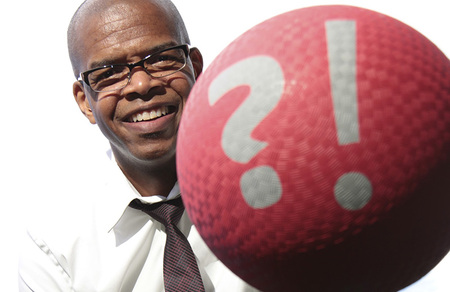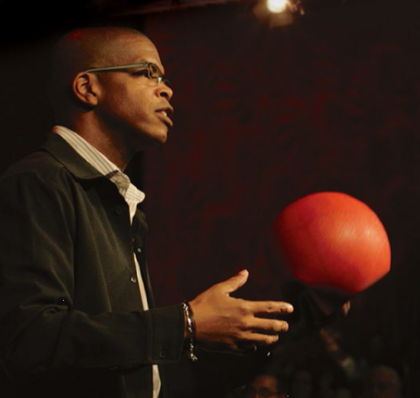What is play to you? Is it something you haven't done in years? Has the hustle and bustle of life caused the world of play to become unfamiliar territory to you? Maybe...just maybe that will change after this article.
That's because the guru of play -- Kevin Carroll, aka the Katalyst -- has something to say about that.
Kevin is the founder of Kevin Carroll Katalyst/LLC and advocates for social change by sharing his passion for sport and play. He's helped the likes of ESPN, Nike, the NBA, the NHL, the Walt Disney Company and Starbucks tap into the dynamics of creativity for new ideas, and has published three books on using play for personal and professional development. Synonymous for the red rubber ball that he displays in his presentations, Kevin has made it his mission to share how play has impacted his life, and how it can positively impact the lives of people around the world.
I had a chance to pick Kevin's brain not too long after his recent presentation at the International Society for Technology in Education conference. Let the games begin.
Marcus: You are a huge advocate for play. But why? How does the idea of play motivate you in your endeavors?
Kevin Carroll: Why PLAY?! -- Think back to your childhood and to the years dominated by playtime, when there were endless hours to fill and the only agenda was to be captivated in the moment, to have fun. 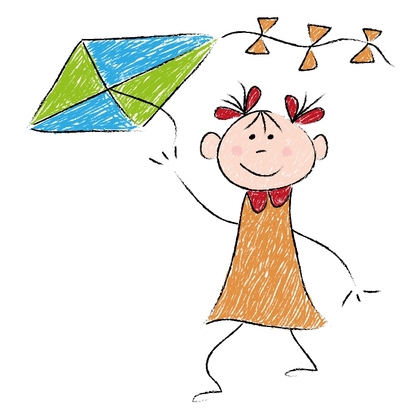
But playtime was also productive time, even if as kids we did not realize it. What we thought was entertaining was also instructive. Activities we called tea party, kick-ball, finger-painting, hide-and-seek, daydreaming, and tag were also exercises in planning, strategy, design, decision-making, creativity, and risk-taking. In play we did not avoid obstacles, we looked for them by voluntarily challenging ourselves. We eagerly tackled insurmountable odds -- height, speed, lack of money -- to make our desires reality. Using imagination, we climbed Mt. Everest, competed in the Super Bowl, conquered the world, made a house out of a cardboard box, and ran a restaurant.
We voluntarily tested ourselves and accepted failure as part of the play. We ran, stumbled, and got up to run again. When we lost a game we simply started a new one. When something did not pan out as intended, we came up with a new solution until we were satisfied. When faced with an enemy or new challenge -- be it a competing team, a broken toy, or our friend playing a cop to our robber, an ogre to our princess -- we figured out how to win, remedy the malfunction, or flee the imagined danger. Far from frivolous time, childhood activities were constructive because they strengthened our resolve as well as our skills. Play gave us courage and instilled confidence. No doubt about it, the many forms of play -- board games, sports, pretending, arts-and-crafts, exploring, building -- required us to invent, analyze, innovate, socialize, plan, and problem solve. Play was serious business in our youth and play should continue to be serious business in our adult life!
I believe that sport and play are common human denominators and equalizers. No matter where you go in the world -- regardless of socioeconomic, political or religious system -- sport and play are present. Stories abound about the use of sport and play as social innovation tools versus foes of the human condition -- HIV/AIDS, gender inequity, social exclusion, homelessness, illiteracy, natural disaster, conflict and many others -- and there are human catalysts who utilize it to inspire change and action. I want to support the human catalysts using sport/play as a social innovation tool; participate and/or support their efforts to advance the human condition via sport/play; and share their remarkable stories about the power of sport/play as a game changer!
MTW: For those who do not know, what is the significance of the red rubber ball that has become your trademark?
KC: My parents chose their addiction over raising three sons. The pinnacle moment of my parents' neglect resulted in the three of us being "rescued" by a stranger, shuttled down to a greyhound bus station in Bowling Green, VA, placed on a bus alone (ages eight, six, and three) and sent on a 200+ mile, one-way fare to my grandparents' house just outside Philadelphia. Without parents in my life, I resorted to finding my life lessons from many sources: businessmen and laborers, winos and alcoholics, drug dealers and users, sport coaches, my peers and old-heads at the playground, merchants, war vets, school teachers, librarians, custodians, food service workers, and other kids' moms and dads. I learned to be constantly on the lookout for any nugget of insight that would assist me on my quest to rise above my suffering and circumstances.
I spent endless hours at the neighborhood playground where I found my calling: a red rubber ball. That red rubber ball (a.k.a. sports & play) and Preston Playground proved to be a catalyst in my journey from a hardscrabble upbringing filled with dysfunction, upheaval, and uncertainty to becoming an author, a speaker and a global change agent. Preston Playground + school + the public library (coupled with an unexpected "+ uplifting community of encouragers") were all instrumental in my effort to rise above my circumstances.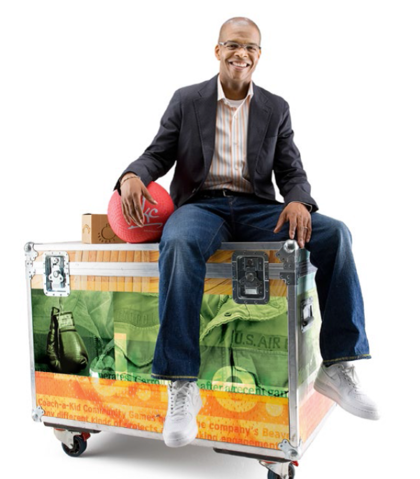
I know firsthand about the transformative power and value of sport/play + how a *BALL can save/change someone's life (*BALL = whatever inspires you, brings you joy, gives you a reason to get outta bed in the morning & accomplish things!). I believe that the "red rubber ball" is an activity that inspires us, brings us joy and fuels our imagination to dream BIG! Discovering your "red rubber ball" sparks you to make a commitment to chase and pursue it for a lifetime.
[As mentioned earlier], take a moment and think back to your childhood and to the years dominated by playtime, exploration, curiosity and investigating anything and everything. There were endless hours to fill and the only agenda was to be captivated in the moment, to have fun and thoroughly enjoy the day. Ask yourself: What brought me joy? What inspired me? What did I find irresistible and "tickled" my brain? When you participated in moments/activities that answered those questions, you were enjoying your red rubber ball! You found ways (and continue to find ways!) to be around that primal source of joy. Your "red rubber ball" inspires you to tap into a seemingly endless supply of energy, cleverness, resourcefulness and creative agility to ensure that you are always attached to it. Your "work" is always your PLAY! ("The master in the art of living makes little distinction between his work and his play..." - James Michener)
MTW: Discovering your red rubber ball is a key moment in your story. What has been another defining moment in your life?
KC: Meeting my CEO (Chief Encouragement Officer of my DREAMS) - Phyllis Lane (aka Miz Lane). See this story -- "You Changed My Life/YCML Miz Lane" (under "The Catalyst for my Journey" entry).
MTW: Okay, a little role play (see...I get it!). I'm a principal and my school district has told me that the main thing that matters is that my school's test scores improve. How do you convince me that play fits in with this agenda?
KC: I will share a PLETHORA of PLAY research to open your eyes to why play and recess are catalysts for academic success + stories of what I've personally witnessed in successful school communities + share my story of how movement/play/recess served as a catalyst for my academic success. A few examples:
Playworks
US PLAY COALITION - Making a Case for Recess
The Secret Behind Finland's Smartest School Kids? RECESS (2013)
Active Living Research (2012)
MTW: Okay, some more role play. I'm an adult who just goes through the motions every day and I don't believe much can change about this. How can I take steps to incorporate a mindset of play, and how does this help?
KC: Nurture your Neoteny... I heard the term neoteny used several years ago by Dr. Stuart Brown, Founder of the National Institute for Play and author of the book entitled PLAY. He shared with me some of the research which explained that in most species there are "adult-aged" members that retain youthful-like traits and behavior. As Dr. Brown put it, "neoteny is the state or attitude of perpetual immaturity and playfulness." To further support the idea of being playful in adulthood, the 2007 New York Times Magazine Idea Issue also shared a reference similar to the one that Dr. Brown shared with me - psychological neoteny. In the NYT Magazine piece, Dr. Bruce Charlton shares his research on the value of a youthful state of mind for adults in the 21st century. He hypothesizes that the demands of the 21st century regarding such things as embracing technological advances and dealing with the uncertainty of business and personal situations, especially change, require adults to take a much more teen-like approach (i.e. be more adaptable, malleable, and open to new things, etc.). I believe both of these definitions for neoteny provide adults with a scientific reason and empirical justification to value play and fun. We should find ways not to marginalize it to simply a weekend or holiday/vacation pursuit. The "kid-within-us-all" needs to be given permission to have FUN regularly (especially in the workplace) and celebrate play's BIG purpose throughout our entire life -- Dr. Brown and Dr. Charlton have obliged! See JWT Trend Report: PLAY as a Competitive Advantage.
MTW: What do you believe is the future of play? Will it become more prominent or even more necessary in our society?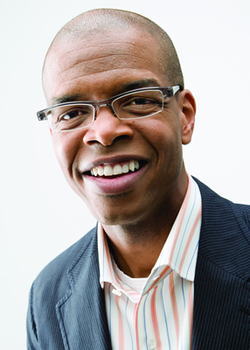
KC: I envision more creative + clever + ingenuous ways that play will be incorporated into our lives as an integral part of personal/professional/academic development and success -- we are gonna LevelUP! for Life! More play: leadership development via gaming tools; more physical gaming devices/apps; more brain-fitness (Dr. John Ratey/Harvard/SPARK); more FREE/Unstructured Play.
MTW: If a person meets you, or hears you speak, and only understands one thing about you or your message, what would you want that to be?
KC: That it's easy to see WHY* he gets UP every day (*Inspiration) + WHAT* he's chasing/pursing (*3 focuses -- Education/Sport&Play/Improving the Lives of Others) + HOW* he's contributing to advancing the human condition in a positive way (*Impact -- my actions may seem small but their collective impact will be great!)
***
Images of Kevin Carroll used with permission.
"Child at Play" illustration from http://www.freeimages.com/photo/1401173

